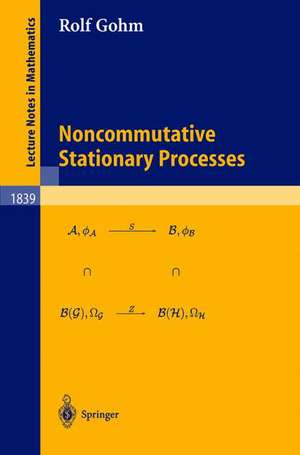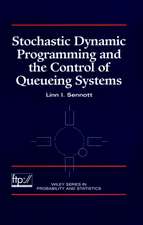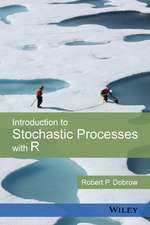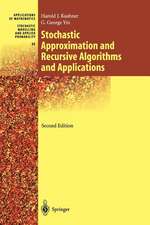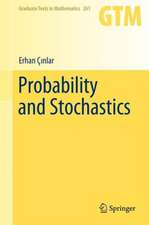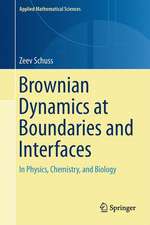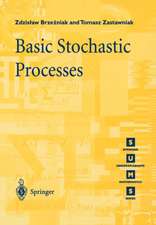Noncommutative Stationary Processes: Lecture Notes in Mathematics, cartea 1839
Autor Rolf Gohmen Limba Engleză Paperback – 4 mar 2004
Din seria Lecture Notes in Mathematics
- 17%
 Preț: 360.43 lei
Preț: 360.43 lei -
 Preț: 459.92 lei
Preț: 459.92 lei -
 Preț: 121.41 lei
Preț: 121.41 lei -
 Preț: 175.68 lei
Preț: 175.68 lei -
 Preț: 197.00 lei
Preț: 197.00 lei -
 Preț: 279.76 lei
Preț: 279.76 lei -
 Preț: 477.66 lei
Preț: 477.66 lei - 17%
 Preț: 361.89 lei
Preț: 361.89 lei -
 Preț: 252.37 lei
Preț: 252.37 lei -
 Preț: 353.99 lei
Preț: 353.99 lei -
 Preț: 138.88 lei
Preț: 138.88 lei -
 Preț: 152.61 lei
Preț: 152.61 lei -
 Preț: 116.67 lei
Preț: 116.67 lei -
 Preț: 102.77 lei
Preț: 102.77 lei - 17%
 Preț: 365.53 lei
Preț: 365.53 lei -
 Preț: 396.76 lei
Preț: 396.76 lei - 17%
 Preț: 362.15 lei
Preț: 362.15 lei -
 Preț: 396.13 lei
Preț: 396.13 lei -
 Preț: 357.80 lei
Preț: 357.80 lei - 17%
 Preț: 362.31 lei
Preț: 362.31 lei -
 Preț: 403.81 lei
Preț: 403.81 lei - 17%
 Preț: 361.73 lei
Preț: 361.73 lei -
 Preț: 499.87 lei
Preț: 499.87 lei -
 Preț: 457.03 lei
Preț: 457.03 lei -
 Preț: 395.91 lei
Preț: 395.91 lei -
 Preț: 459.00 lei
Preț: 459.00 lei -
 Preț: 487.57 lei
Preț: 487.57 lei -
 Preț: 424.01 lei
Preț: 424.01 lei -
 Preț: 487.57 lei
Preț: 487.57 lei -
 Preț: 330.55 lei
Preț: 330.55 lei -
 Preț: 325.75 lei
Preț: 325.75 lei -
 Preț: 350.30 lei
Preț: 350.30 lei -
 Preț: 331.31 lei
Preț: 331.31 lei -
 Preț: 408.37 lei
Preț: 408.37 lei -
 Preț: 328.25 lei
Preț: 328.25 lei -
 Preț: 421.28 lei
Preț: 421.28 lei -
 Preț: 276.08 lei
Preț: 276.08 lei -
 Preț: 424.60 lei
Preț: 424.60 lei -
 Preț: 422.05 lei
Preț: 422.05 lei -
 Preț: 505.01 lei
Preț: 505.01 lei -
 Preț: 422.05 lei
Preț: 422.05 lei -
 Preț: 274.93 lei
Preț: 274.93 lei -
 Preț: 335.16 lei
Preț: 335.16 lei -
 Preț: 422.27 lei
Preț: 422.27 lei -
 Preț: 497.49 lei
Preț: 497.49 lei -
 Preț: 272.81 lei
Preț: 272.81 lei -
 Preț: 428.04 lei
Preț: 428.04 lei -
 Preț: 376.22 lei
Preț: 376.22 lei -
 Preț: 427.10 lei
Preț: 427.10 lei -
 Preț: 325.92 lei
Preț: 325.92 lei
Preț: 348.35 lei
Nou
Puncte Express: 523
Preț estimativ în valută:
66.67€ • 69.34$ • 55.04£
66.67€ • 69.34$ • 55.04£
Carte tipărită la comandă
Livrare economică 15-29 aprilie
Preluare comenzi: 021 569.72.76
Specificații
ISBN-13: 9783540209263
ISBN-10: 3540209263
Pagini: 180
Ilustrații: VIII, 172 p.
Dimensiuni: 155 x 235 x 9 mm
Greutate: 0.27 kg
Ediția:2004
Editura: Springer Berlin, Heidelberg
Colecția Springer
Seria Lecture Notes in Mathematics
Locul publicării:Berlin, Heidelberg, Germany
ISBN-10: 3540209263
Pagini: 180
Ilustrații: VIII, 172 p.
Dimensiuni: 155 x 235 x 9 mm
Greutate: 0.27 kg
Ediția:2004
Editura: Springer Berlin, Heidelberg
Colecția Springer
Seria Lecture Notes in Mathematics
Locul publicării:Berlin, Heidelberg, Germany
Public țintă
ResearchCuprins
Preface.- Introduction.- 1. Extensions and dilations.- 2. Markov processes.- 3. Adaptedness.- 4. Examples and applications.- A. Some facts about unital completely positive maps.- References.- Index.
Textul de pe ultima copertă
Quantum probability and the theory of operator algebras are both concerned with the study of noncommutative dynamics. Focusing on stationary processes with discrete-time parameter, this book presents (without many prerequisites) some basic problems of interest to both fields, on topics including extensions and dilations of completely positive maps, Markov property and adaptedness, endomorphisms of operator algebras and the applications arising from the interplay of these themes. Much of the material is new, but many interesting questions are accessible even to the reader equipped only with basic knowledge of quantum probability and operator algebras.
Caracteristici
Includes supplementary material: sn.pub/extras
